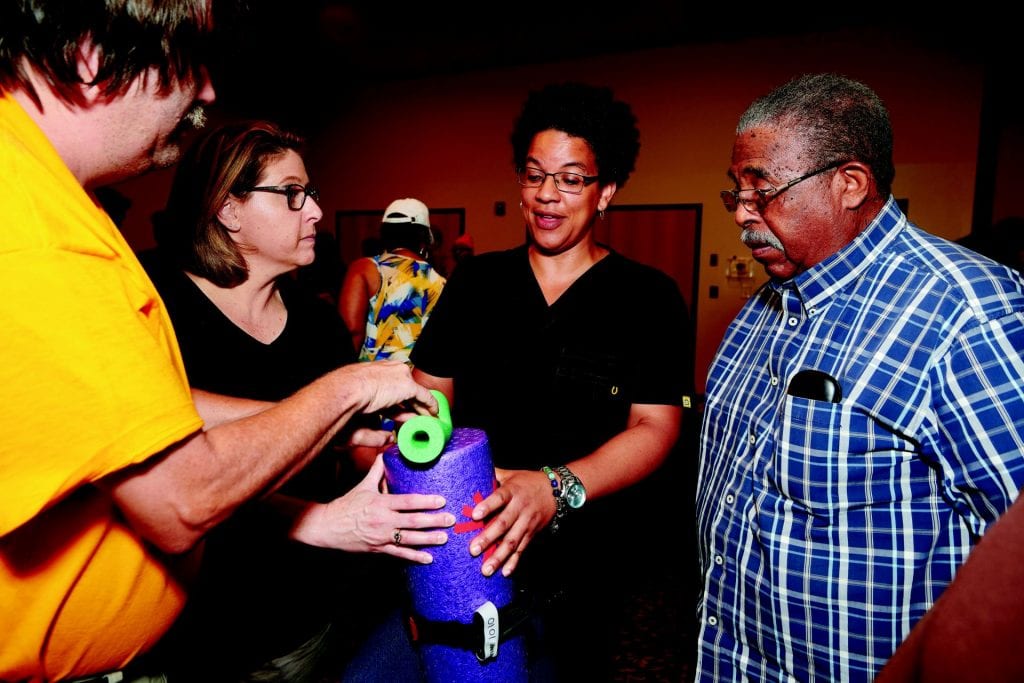Focus: Reduce the impact of gun violence

With health researchers recognizing gun violence as a growing public health crisis,* Washington University trauma surgeon Laurie Punch, MD, is moving to the forefront of the battle to lessen the impact of gun violence and improve medical outcomes.
Punch, who treats many victims of firearm violence at Barnes-Jewish Hospital, joined the faculty in 2016 as gun homicide rates in St. Louis had started to sharply rise. Long interested in trauma as a disease highly influenced by social factors, she entered the community’s gun violence dialogue as a panelist in a forum sponsored by Better Family Life (BFL), a local nonprofit social services organization. “The discussion was really intense,” she recalls.
While mass shootings are widely covered by the news, they account for only a tiny fraction of firearm deaths; guns claim many more victims in urban centers.† After the panel discussion, Punch approached BFL’s leader, James Clark. It was clear he saw a disconnect between the community and the Washington University Medical Campus. “Where’s the help?” he asked.
Punch decided to bring the Stop the Bleed campaign to St. Louis. A national initiative, Stop the Bleed teaches easy bleeding control steps developed by the American College of Surgeons: 1) apply pressure to a bleeding wound and 2) use a tourniquet. The steps can empower bystanders who are at the scene of accidents, injuries or shootings to help save lives. Why? Because victims of uncontrolled bleeding often die before emergency personnel arrive on scene.
For 18 months, Punch worked to develop trust with Clark. She finally made inroads after first-year medical student Jane Hayes wrote an analysis showing parallel interests between the Stop the Bleed campaign and gun violence de-escalation centers.
Punch’s team, led by Hayes as student coordinator and general surgery resident Erin Andrade, MD, MPH, as resident coordinator, now holds Stop the Bleed sessions at BFL-sponsored classes and in other settings. Since classes began in March 2018, the team has reached approximately 2,000 participants.
Punch ultimately wants to empower community members, including children. Her message: “You have power to influence your own life.”
*Global Mortality From Firearms, 1990-2016,” Journal of the American Medical Association, August 2018.
†Washington Post, “The terrible numbers that grow with each mass shooting,” updated Sept. 14, 2018.
Highlights
Acute and critical care surgeons now staff a new intensive care unit that opened in early 2018 in the new Barnes-Jewish Parkview Tower, expanding clinical facilities at the Medical Campus. The section also provides general surgery and ICU staffing at Christian Hospital, serving north St. Louis County. Further expansion of services within BJC HealthCare brings e-ICU services to community hospitals via a monitoring facility near the campus. Washington University critical care surgeons and nurses, led in part by e-ICU associate director Sara Buchman, MD, PharmD, monitor ICU patients remotely, 24 hours a day.
Piroska Kopar, MD, joins the section as an assistant professor of surgery after serving as a clinical fellow at Yale University and an instructor at Dartmouth College. She is completing the Surgical Education Research Fellowship offered by the Association for Surgical Education, which equips investigators with the skills to plan, implement and report research studies in surgical education. Kopar’s focus is surgical ethics, and she will take a leadership role here in discussing ethical issues with general surgery residents. Professor Emeritus Ira Kodner, MD, and Vice Chair for Education Mary Klingensmith, MD, considered national leaders in surgical ethics, developed the residency’s ethics training programs.
A Level II Trauma Center at Memorial Hospital in Carbondale, Ill., has been established through a collaborative agreement between BJC HealthCare, the Southern Illinois Hospital System, and Washington University. It will be overseen by Section Chief Grant Bochicchio, MD, MPH. The new center will improve trauma care in southern Illinois and eventually be included in the Barnes-Jewish Hospital Morbidity and Mortality trauma conference via telemedicine.
